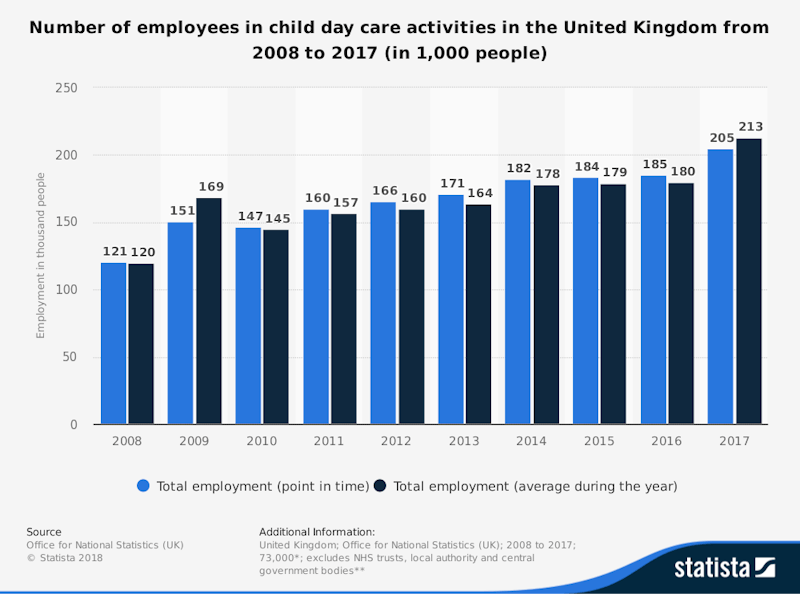Study Notes
Revenues and Costs: The UK Child Day Care Industry
- Level:
- AS, A-Level, IB
- Board:
- AQA, Edexcel, OCR, IB, Eduqas, WJEC
Last updated 16 Feb 2019
The number of people employed in the UK child day care sector has grown from 110,000 in 2008 to over 200,000 in 2016-17. Revenues for child care providers have also expanded, indeed in 2017, the total turnover of child day care activities was over £4.3 billion.
Revenues however are not the same as profits and a number of day care providers have left the industry because they are unable to maintain commercial viability. After a surge in 2015, in 2017, there were around 13,600 enterprises for child day care activities in the UK compared to 7,500 in 2008.

The day child care sector is a good example of monopolistic competition. The barriers to entry into the sector are relatively low and market concentration is low. The industry is fragmented, and no established service providers have a market share of over 5%. Busy Bees and Bright Horizons are two of the larger operators in the UK.
What are the key factors influencing revenue growth for the industry?
These factors include:
- Real disposable incomes of households with young children
- Availability and generosity of government financed subsidies (tax free) for child care
- Demographic factors such as the natural rate of population growth
- Changes in the female participation rate in the labour market
- Changes in unemployment and structural changes in the labour market such as the rise of self-employment and the gig economy
- Depth of competition between child care providers with the possible impact on average fees charged

Cost factors affecting the profitability of child care providers in the UK
These factors include:
- Hourly wage costs affected for example by changes in the national living wage
- Wage costs also influenced by availability of trained staff which in turn might be impacted by reductions in net inward migration after the UK leaves the European Union
- Other operating costs such as building rents, compliance costs and the cost of providing meals
Despite the UK government extending provision for tax-free child care for very early years, the United Kingdom has some of the highest childcare costs in the world. A report published in 2018 found that the average UK price of 25 hours of childcare a week for a child under two in a nursery was £122 (£6300 per year). There are big regional variations, child care costs per hour are 70% higher in Inner London than in Yorkshire and Humber.
The UK government offers tax-free 15 hours of free childcare available over 38 weeks of the year to all parents of 3 and 4 year olds. More details here.
You might also like

Profit Satisficing and Profitability Factors
30th January 2014

FT Video: Takeovers Explained
10th February 2016

Shut Down Points: The Rise and Fall of Blackberry
30th September 2016

Higher or Lower? Revenue streams of European football clubs
7th February 2019

Energy Price Crisis - Many Small Businesses May Not Survive
14th August 2022

Business Growth - Asda buys EG Group
30th May 2023
Daily Email Updates
Subscribe to our daily digest and get the day’s content delivered fresh to your inbox every morning at 7am.
Signup for emails